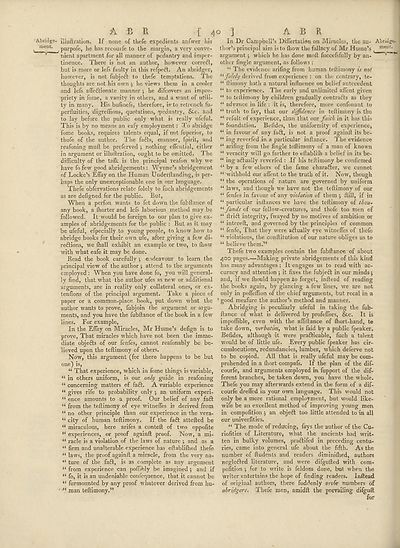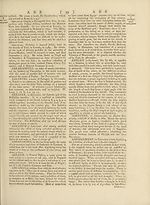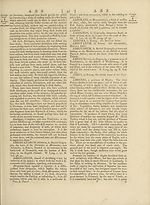Encyclopaedia Britannica, or, a Dictionary of arts, sciences, and miscellaneous literature : enlarged and improved. Illustrated with nearly six hundred engravings > Volume 1, A-AME
(58) Page 40
Download files
Complete book:
Individual page:
Thumbnail gallery: Grid view | List view

A B R f 40 ] A B R
Abridge- illuflration. If none of thefe expedients anfvver his
, luent’ purpofe, he has recourfe to the margin, a very conve-
nient apartment for all manner of pedantry and imper¬
tinence. There is not an author, however correft,
but is more or lefs faulty in this refpeft. An abridger,
however, is not fubjeft to thefe temptations. The
thoughts are not his own j he views them in a cooler
and lefs affeftionate manner ; he difcovers an impro¬
priety in fome, a vanity in others, and a want of utili¬
ty in many. His bufinefs, therefore, is'to retrench fu-
perfluities, digreffions, quotations, ‘pedantry, &c. and
to lay before the public only what is really ufeful.
This is by no means an eafy employment : To abridge
fome books, requires talents equal, if not fuperior, to
thofe of the author. The fadts, -manner, fpirit, and
reafoning muft be preferved ; nothing effential, either
in argument or illuftration, ought to be omitted. The
difficulty of the talk is the principal reafon why we
have fo few good abridgements : Wynne’s abridgement
of Locke’s Effay on the Human Underilanding, is per¬
haps the only unexceptionable one in our language.
Thefe obfervations relate folely to fuch abridgements
as are defigned for the public. But,
When a perfon wants to fet down the fubftance of
any book, a ffiorter and lefs laborious method may be
followed. It would be foreign to our plan to give ex¬
amples of abridgements for the public : But as it may
be ufeful, efpecially to young people, to know how to
abridge books for their own ufe, after giving a few di-
reftions, we ffiall exhibit an example or two, to (how
with what eafe it may be done.
Read the book carefully 5 endeavour to learn the
principal view of the author j attend to the arguments
employed : When you have done fo, you will general¬
ly find, that what the author ufes as new or additional
arguments, are in reality only collateral ones, or ex-
tenfions of the principal argument. Take a piece of
paper or a common-place book, put down what the
author wants to prove, fubjoin the argument or argu¬
ments, and you have the fubftance of the book in a few
lines. For example,
In the Eflay on Miracles, Mr Hume’s defign is to
prove, That miracles which have not been the imme¬
diate objects of our fenfes, cannot reafonably be be¬
lieved upon the teftimony of others.
Now, this argument (for there happens to be but
one) is,
“ That experience, which in fome things is variable,
“ in others uniform, is our only guide in reafoning
“ concerning matters of faft. A variable experience
“ gives rife to probability only ; an uniform experi-
“ ence amounts to a proof. Our belief of any fadt
“ from the teftimony of eye witneffes is derived from
“ no other principle than our experience in the vera-
“ city of human teftimony. If the faft attefted be
“ miraculous, here arifes a conteft of two oppofite
“ experiences, or proof againft proof. Now, a mi-
“ racle is a violation of the laws of nature ; and as a
“ firm and unalterable experience has eftabliffied thefe
“ laws, the proof againft a miracle, from the very na-
“ ture of the fadl, is as complete as any argument
“ from experience can poffibly be imagined ; and if
“ fo, it is an undeniable confequence, that it cannot be
“ furmounted by any proof whatever derived from hu-
H man teftimony.”
In Dr Campbell’s Diflertation on Miracles, the au- Abridge
thor’s principal aim is to (how the fallacy of Mr Hume’s
argument ; which he has done moft fuccefsfully by an-
other fingle argument, as follows :
“ The evidence arifing from human teftimony is not
il folely derived from experience : on the contrary, te-
“ ftimony hath a natural influence on belief antecedent
“ to experience. The early and unlimited aflent given
“ to teftimony by children gradually contradts as they
“ advance in life : it is, therefore, more confonant to
“ truth to fay, that our diffidence in teftimony is the
‘^refult of experience, than that our faith in it has this
“ foundation. Befides, the uniformity of experience,
“ in favour of any fadt, is not a proof againft its be-
“ ing reverfed in a particular inftance. The evidence
“ arifing from the fingle teftimony of a man of known
“ veracity will go farther to eftabliffi a belief in its be-
“ ing adtually reverfed : If his teftimony be confirmed
by a few others of the fame charadter, we cannot
“ withhold our aflent to the truth of it. Now, though
“ the operations of nature are governed by uniform
“ laws, and though we have not the teftimony of our
“ fenfes in favour of any violation of them •, (till, if in
“ particular inftances w7e have the teftimony of thou-
i( fands of our fellow-creatures, and thofe too men of
“ ftridl integrity, fwayed by no motives of ambition or
“ intereft, and governed by the principles of common
“ fenfe, That they wrere adtually eye witnefles of thefe
“ violations, the conftitution of our nature obliges us to
“ believe them.”
Thefe two examples contain the fubftance of about
400 pages.—Making private abridgements of this kind
has many advantages : It engages us to read W'ith ac¬
curacy and attention •, it fixes the fubjedt in our minds j
and, if we ffiould happen to forget, inftead of reading
the books again, by glancing a few lines, wTe are not
only in pofleffion of the chief arguments, but recal in a
f good meafure the author’s method and manner.
Abridging is peculiarly ufeful in taking the fub¬
ftance of what is delivered by profeflbrs, &c. It is
impoffible, even with the affiftance of (hort-hand, te
take down, verbatim, what is faid by a public fpeaker.
Befides, although it were pradticable, fuch a talent
wnuld be of little ufe. Every public fpeaker has cir¬
cumlocutions, redundancies, lumber, which deferve not
to be copied. All that is really ufeful may be com¬
prehended in a ffiort compafs. If the plan of the dif-
courfe, and arguments employed in fupport of the dif¬
ferent branches, be taken down, you have the whole.
Thefe you may afterwards extend in the form of a dif-
courfe drefled in your own language. This would not
only be a more rational employment, but would like-
wife be an excellent method of improving young men
in compofition j an objeft too little attended to in all
our univerfities.
“ The mode of reducing, fays the author of the Cu-
riofities of Literature, what the ancients had writ¬
ten in bulky volumes, pra£tifed in preceding centu¬
ries, came into general ufe about the fifth. As the
number of ftudents and readers diminifhed, authors
negle&ed literature, and were difgufted with com¬
pofition \ for to write is feldom done, but when the
writer entertains the hope of finding readers. Inftead
of original authors, there fuddenly arofe numbers of
abridgers. Thefe men, amidft the prevailing difguft
Abridge- illuflration. If none of thefe expedients anfvver his
, luent’ purpofe, he has recourfe to the margin, a very conve-
nient apartment for all manner of pedantry and imper¬
tinence. There is not an author, however correft,
but is more or lefs faulty in this refpeft. An abridger,
however, is not fubjeft to thefe temptations. The
thoughts are not his own j he views them in a cooler
and lefs affeftionate manner ; he difcovers an impro¬
priety in fome, a vanity in others, and a want of utili¬
ty in many. His bufinefs, therefore, is'to retrench fu-
perfluities, digreffions, quotations, ‘pedantry, &c. and
to lay before the public only what is really ufeful.
This is by no means an eafy employment : To abridge
fome books, requires talents equal, if not fuperior, to
thofe of the author. The fadts, -manner, fpirit, and
reafoning muft be preferved ; nothing effential, either
in argument or illuftration, ought to be omitted. The
difficulty of the talk is the principal reafon why we
have fo few good abridgements : Wynne’s abridgement
of Locke’s Effay on the Human Underilanding, is per¬
haps the only unexceptionable one in our language.
Thefe obfervations relate folely to fuch abridgements
as are defigned for the public. But,
When a perfon wants to fet down the fubftance of
any book, a ffiorter and lefs laborious method may be
followed. It would be foreign to our plan to give ex¬
amples of abridgements for the public : But as it may
be ufeful, efpecially to young people, to know how to
abridge books for their own ufe, after giving a few di-
reftions, we ffiall exhibit an example or two, to (how
with what eafe it may be done.
Read the book carefully 5 endeavour to learn the
principal view of the author j attend to the arguments
employed : When you have done fo, you will general¬
ly find, that what the author ufes as new or additional
arguments, are in reality only collateral ones, or ex-
tenfions of the principal argument. Take a piece of
paper or a common-place book, put down what the
author wants to prove, fubjoin the argument or argu¬
ments, and you have the fubftance of the book in a few
lines. For example,
In the Eflay on Miracles, Mr Hume’s defign is to
prove, That miracles which have not been the imme¬
diate objects of our fenfes, cannot reafonably be be¬
lieved upon the teftimony of others.
Now, this argument (for there happens to be but
one) is,
“ That experience, which in fome things is variable,
“ in others uniform, is our only guide in reafoning
“ concerning matters of faft. A variable experience
“ gives rife to probability only ; an uniform experi-
“ ence amounts to a proof. Our belief of any fadt
“ from the teftimony of eye witneffes is derived from
“ no other principle than our experience in the vera-
“ city of human teftimony. If the faft attefted be
“ miraculous, here arifes a conteft of two oppofite
“ experiences, or proof againft proof. Now, a mi-
“ racle is a violation of the laws of nature ; and as a
“ firm and unalterable experience has eftabliffied thefe
“ laws, the proof againft a miracle, from the very na-
“ ture of the fadl, is as complete as any argument
“ from experience can poffibly be imagined ; and if
“ fo, it is an undeniable confequence, that it cannot be
“ furmounted by any proof whatever derived from hu-
H man teftimony.”
In Dr Campbell’s Diflertation on Miracles, the au- Abridge
thor’s principal aim is to (how the fallacy of Mr Hume’s
argument ; which he has done moft fuccefsfully by an-
other fingle argument, as follows :
“ The evidence arifing from human teftimony is not
il folely derived from experience : on the contrary, te-
“ ftimony hath a natural influence on belief antecedent
“ to experience. The early and unlimited aflent given
“ to teftimony by children gradually contradts as they
“ advance in life : it is, therefore, more confonant to
“ truth to fay, that our diffidence in teftimony is the
‘^refult of experience, than that our faith in it has this
“ foundation. Befides, the uniformity of experience,
“ in favour of any fadt, is not a proof againft its be-
“ ing reverfed in a particular inftance. The evidence
“ arifing from the fingle teftimony of a man of known
“ veracity will go farther to eftabliffi a belief in its be-
“ ing adtually reverfed : If his teftimony be confirmed
by a few others of the fame charadter, we cannot
“ withhold our aflent to the truth of it. Now, though
“ the operations of nature are governed by uniform
“ laws, and though we have not the teftimony of our
“ fenfes in favour of any violation of them •, (till, if in
“ particular inftances w7e have the teftimony of thou-
i( fands of our fellow-creatures, and thofe too men of
“ ftridl integrity, fwayed by no motives of ambition or
“ intereft, and governed by the principles of common
“ fenfe, That they wrere adtually eye witnefles of thefe
“ violations, the conftitution of our nature obliges us to
“ believe them.”
Thefe two examples contain the fubftance of about
400 pages.—Making private abridgements of this kind
has many advantages : It engages us to read W'ith ac¬
curacy and attention •, it fixes the fubjedt in our minds j
and, if we ffiould happen to forget, inftead of reading
the books again, by glancing a few lines, wTe are not
only in pofleffion of the chief arguments, but recal in a
f good meafure the author’s method and manner.
Abridging is peculiarly ufeful in taking the fub¬
ftance of what is delivered by profeflbrs, &c. It is
impoffible, even with the affiftance of (hort-hand, te
take down, verbatim, what is faid by a public fpeaker.
Befides, although it were pradticable, fuch a talent
wnuld be of little ufe. Every public fpeaker has cir¬
cumlocutions, redundancies, lumber, which deferve not
to be copied. All that is really ufeful may be com¬
prehended in a ffiort compafs. If the plan of the dif-
courfe, and arguments employed in fupport of the dif¬
ferent branches, be taken down, you have the whole.
Thefe you may afterwards extend in the form of a dif-
courfe drefled in your own language. This would not
only be a more rational employment, but would like-
wife be an excellent method of improving young men
in compofition j an objeft too little attended to in all
our univerfities.
“ The mode of reducing, fays the author of the Cu-
riofities of Literature, what the ancients had writ¬
ten in bulky volumes, pra£tifed in preceding centu¬
ries, came into general ufe about the fifth. As the
number of ftudents and readers diminifhed, authors
negle&ed literature, and were difgufted with com¬
pofition \ for to write is feldom done, but when the
writer entertains the hope of finding readers. Inftead
of original authors, there fuddenly arofe numbers of
abridgers. Thefe men, amidft the prevailing difguft
Set display mode to:
![]() Universal Viewer |
Universal Viewer | ![]() Mirador |
Large image | Transcription
Mirador |
Large image | Transcription
Images and transcriptions on this page, including medium image downloads, may be used under the Creative Commons Attribution 4.0 International Licence unless otherwise stated. ![]()
| Permanent URL | https://digital.nls.uk/193132739 |
|---|
| Attribution and copyright: |
|
|---|
| Description | Ten editions of 'Encyclopaedia Britannica', issued from 1768-1903, in 231 volumes. Originally issued in 100 weekly parts (3 volumes) between 1768 and 1771 by publishers: Colin Macfarquhar and Andrew Bell (Edinburgh); editor: William Smellie: engraver: Andrew Bell. Expanded editions in the 19th century featured more volumes and contributions from leading experts in their fields. Managed and published in Edinburgh up to the 9th edition (25 volumes, from 1875-1889); the 10th edition (1902-1903) re-issued the 9th edition, with 11 supplementary volumes. |
|---|---|
| Additional NLS resources: |
|

